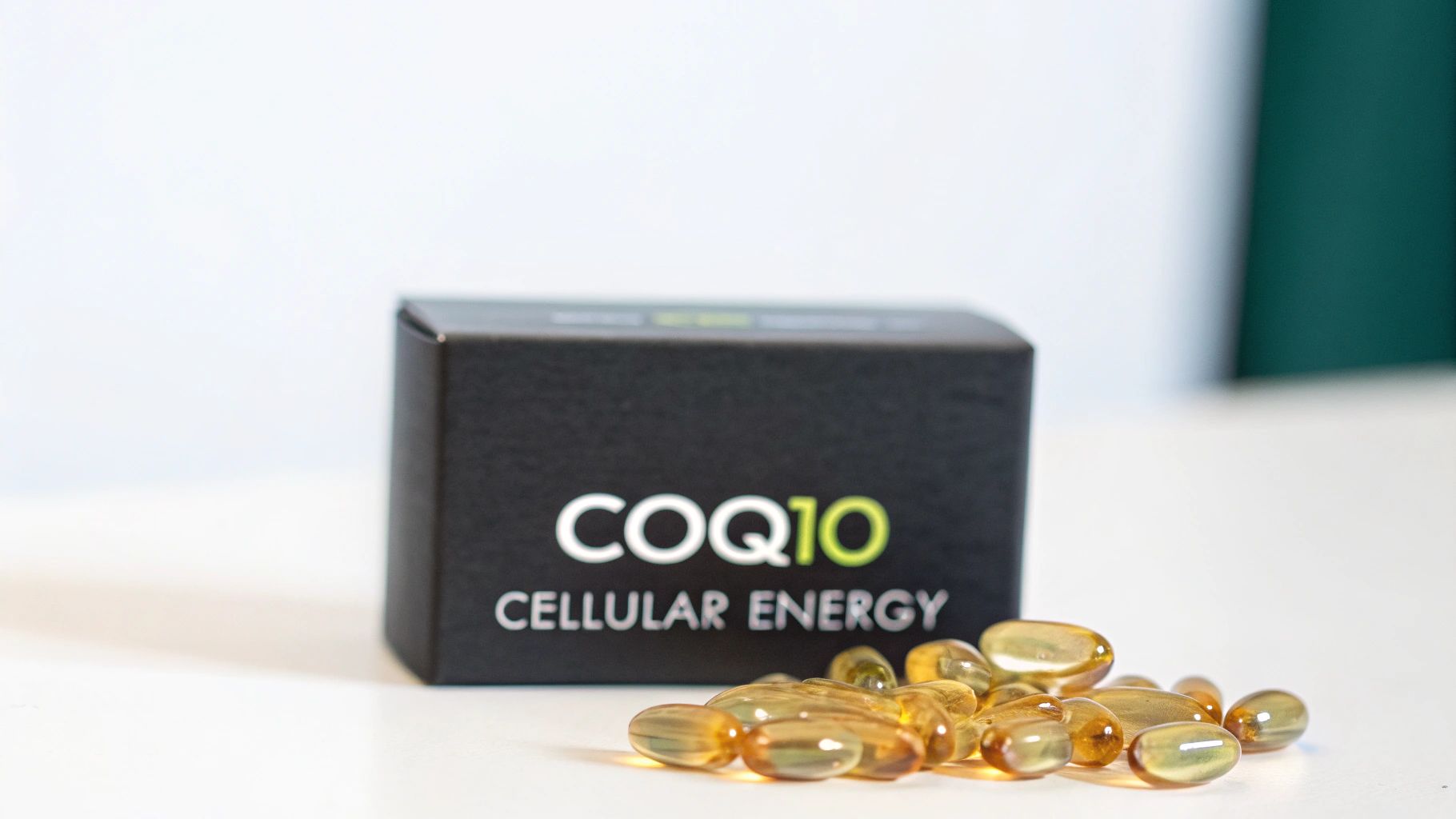Chronic fatigue is more than just feeling tired; it’s a persistent, debilitating exhaustion that sleep alone cannot resolve. This profound lack of energy can interfere with your daily life, making simple tasks feel monumental. To reclaim your vitality, you need to take proactive, targeted action. This guide provides a clear, actionable framework to help you do just that.
We will explore a comprehensive list of powerful natural remedies for chronic fatigue, detailing specific strategies you can implement immediately. From potent adaptogenic herbs and vital nutrient supplementation to foundational lifestyle adjustments like sleep optimisation and anti-inflammatory nutrition, each point is a practical step towards rebuilding your energy reserves from the ground up. This article provides the specific, evidence-informed actions needed to help your body combat stress, restore cellular function, and build a sustainable foundation for lasting energy. Let’s begin the journey to rediscovering your energy.
1. Adaptogenic Herbs (Ashwagandha, Rhodiola, Ginseng)
Adaptogenic herbs are a powerful class of plants that help your body adapt to and resist physical, chemical, and biological stressors. Instead of providing a temporary jolt like caffeine, they work by modulating your body's stress response system. By helping to regulate cortisol levels and support adrenal function, these herbs can restore balance, making them one of the most effective natural remedies for chronic fatigue.

Why They Work for Fatigue
Adaptogens don't just mask tiredness; they help fortify your body's resilience. Ashwagandha, a cornerstone of Ayurvedic medicine, has been shown to significantly reduce cortisol levels, with some studies noting a reduction of up to 27%. This calming effect on the stress hormone can lead to improved energy. Similarly, Rhodiola rosea is proven to enhance work performance and fight fatigue. Panax ginseng is another well-researched adaptogen, with trials showing it enhances both physical and mental energy. To understand how these herbs work, you can explore the benefits of using Ashwagandha for stress relief.
How to Implement Adaptogens
To get the most out of these herbs, follow these steps:
- Start with the Lowest Dose: Begin with the lowest recommended dose on the product label and gradually increase it over a few weeks to allow your body to adjust.
- Take Them Consistently: Adaptogens work cumulatively. Take them daily for at least 6-8 weeks to allow their balancing effects to build up.
- Cycle Your Use: To maintain their effectiveness, take an adaptogen for 6-8 weeks, followed by a 2-week break.
- Choose Standardised Extracts: Purchase high-quality supplements from reputable brands that offer standardised extracts. This ensures you get a consistent and effective dose of the active compounds.
2. Coenzyme Q10 (CoQ10) Supplementation
Coenzyme Q10 (CoQ10) is a compound that exists in every cell of your body, where it plays a fundamental role in energy production. It is a critical component of the mitochondria—the "powerhouses" of your cells—and is directly involved in creating ATP, the body's main energy currency. For individuals experiencing persistent exhaustion, optimising CoQ10 levels can be one of the most impactful natural remedies for chronic fatigue.

Why It Works for Fatigue
CoQ10 addresses fatigue at its cellular source. Research has consistently shown that individuals with chronic fatigue syndrome often have depleted levels of this vital coenzyme. By supplementing, you can directly support your body's ability to generate energy. One study found that patients with chronic fatigue experienced a remarkable 43% improvement in their fatigue scores after taking CoQ10. This is echoed in research on related conditions, where CoQ10 supplementation has been shown to improve energy levels and increase exercise capacity.
How to Implement CoQ10
To effectively use CoQ10 for energy, follow these actional steps:
- Take with a Fatty Meal: CoQ10 is fat-soluble. Improve its absorption by taking it with a source of healthy fats like avocado, nuts, or olive oil.
- Choose the Ubiquinol Form: For enhanced bioavailability, especially if you are over 40, look for supplements containing ubiquinol. This is the active, more readily absorbed form of CoQ10.
- Start with 100-200mg Daily: A standard starting dose is between 100mg and 200mg per day. You can take this in divided doses (e.g., 100mg in the morning and 100mg at midday) to maintain stable levels.
- Opt for Softgels: Choose softgel capsules over hard tablets or powders, as they often contain CoQ10 suspended in oil, which aids absorption.
3. B-Complex Vitamin Therapy
B-complex vitamins are eight essential nutrients that serve as the building blocks for a healthy body. They play a critical role in converting the food you eat into usable energy and are vital for nervous system function. For those struggling with exhaustion, deficiencies in key B vitamins like B12, B6, and folate are common, making targeted B-complex therapy one of the most fundamental natural remedies for chronic fatigue.

Why It Works for Fatigue
B-vitamins are essential cofactors in the biochemical processes that generate ATP, your body's energy currency. Without adequate levels, your energy production pathways cannot function optimally. Vitamin B12 is crucial for nerve function and red blood cell production, and correcting a deficiency can lead to dramatic improvements in energy. Folate (B9) works closely with B12, and studies show supplementation can significantly reduce fatigue. Vitamin B6 is essential for creating neurotransmitters like serotonin and dopamine, which regulate mood and motivation.
How to Implement B-Complex Therapy
To effectively replenish your B-vitamin stores, take these steps:
- Choose Methylated Forms: For superior bioavailability, select supplements containing the active, methylated forms of B vitamins, such as methylcobalamin (B12) and methylfolate (B9). These are more easily utilised by the body.
- Time It Right: Take your B-complex supplement in the morning or early afternoon with a meal. This timing aligns with your body's natural energy cycles and prevents potential stomach upset.
- Consider Bioavailability: If you suspect poor absorption, ask your doctor about sublingual (under the tongue) B12 or B12 injections, which offer higher bioavailability than standard oral tablets.
- Test, Don't Guess: Before starting a high-dose regimen, ask your doctor for a blood test to check your B12 and folate levels. This allows for targeted supplementation based on your specific needs.
4. Magnesium Supplementation
Magnesium is a vital mineral that participates in over 300 biochemical reactions in the body, playing an indispensable role in energy production, nerve function, and muscle health. A significant portion of the population has suboptimal magnesium levels. For those struggling with chronic exhaustion, a deficiency in this mineral can directly hinder cellular energy creation, making it one of the most foundational natural remedies for chronic fatigue.

Why It Works for Fatigue
Magnesium is essential for creating ATP, the body's primary energy currency. Without adequate magnesium, your cells cannot produce enough energy to function optimally. Studies have revealed that as many as 75% of individuals with chronic fatigue syndrome are deficient in magnesium. Research shows that supplementing with magnesium malate led to notable improvements in energy and a reduction in muscle pain. Another form, magnesium glycinate, is well-regarded for its calming effect on the nervous system, with trials showing it can improve sleep quality and duration.
How to Implement Magnesium
To effectively use magnesium to combat fatigue, follow these steps:
- Choose Chelated Forms: Select highly bioavailable forms like magnesium glycinate, malate, or citrate. These are absorbed more efficiently and are less likely to cause digestive issues than magnesium oxide.
- Start Low and Increase Slowly: Begin with a dose of around 150-200 mg per day and gradually increase it to find your optimal dose without side effects.
- Time Your Intake: Take your magnesium supplement in the evening, about an hour before bed. This can enhance its natural muscle-relaxing properties and promote deeper, more restorative sleep.
- Take with Food: Consume your magnesium supplement with a meal to minimise the risk of any potential digestive upset.
5. Iron Deficiency Correction (for those with low iron)
Iron is a critical mineral responsible for transporting oxygen throughout your body and is essential for cellular energy production. An iron deficiency, a common cause of persistent tiredness, can exist even without a formal diagnosis of anaemia. Because iron is a core component of haemoglobin, insufficient levels directly impair your body's ability to produce energy, making iron status a vital consideration when seeking natural remedies for chronic fatigue.
Why It Works for Fatigue
Correcting low iron levels can dramatically improve energy by restoring your body's oxygen-carrying capacity. Fatigue is one of the most common symptoms of iron deficiency. Studies have shown significant improvements in fatigue scores in non-anaemic women with low ferritin (stored iron) levels after iron supplementation. Research demonstrates that correcting an iron deficiency can enhance exercise tolerance and improve cognitive functions like memory and attention.
How to Implement Iron Correction
Proper iron supplementation requires a careful and strategic approach. Follow these steps:
- Test, Don't Guess: Before starting any iron supplement, ask your GP for a blood test to check your ferritin levels. This is the most accurate marker of your body's total iron stores.
- Boost Absorption: Take your iron supplement with a source of vitamin C, such as a small glass of orange juice or a vitamin C tablet, to significantly enhance its absorption.
- Time It Right: Take iron on an empty stomach, at least one hour before or two hours after a meal. Avoid taking it with calcium, coffee, or tea, as these can inhibit absorption.
- Choose Gentle Forms: If standard iron supplements cause digestive upset, choose gentler, more easily absorbed forms like iron bisglycinate. As one of the most important minerals, you can explore the benefits of trace minerals to understand their wider impact.
6. Sleep Hygiene and Circadian Rhythm Optimisation
Sleep hygiene refers to the habits and environmental factors essential for high-quality sleep. For anyone with chronic fatigue, a disrupted sleep-wake cycle is often a significant underlying issue. Optimising your circadian rhythm—your body's internal 24-hour clock—is fundamental because it governs hormone release, cellular repair, and energy regulation, making it one of the most powerful natural remedies for chronic fatigue.
Why It Works for Fatigue
Fixing your sleep resets the core biological processes that produce energy. When your circadian rhythm is aligned, your body produces cortisol in the morning to wake you up and melatonin in the evening to help you sleep. Misalignment perpetuates a vicious cycle of daytime grogginess and nighttime restlessness. Studies show that structured sleep hygiene interventions can lead to a significant improvement in fatigue scores, sometimes by as much as 40%, by enhancing restorative deep sleep and REM stages.
How to Implement Sleep Hygiene
A disciplined, consistent approach is key to resetting your body clock. Focus on these actionable steps:
- Maintain a Strict Schedule: Go to bed and wake up at the same time every day, including on weekends. This consistency is the single most important factor in stabilising your circadian rhythm.
- Manage Light Exposure: Get at least 10-15 minutes of direct sunlight within the first hour of waking. In the evening, dim bright lights and stop using screens 2-3 hours before bed. Use blue-light-blocking glasses to protect melatonin production.
- Create a Sleep Sanctuary: Keep your bedroom cool, dark, and quiet. Use blackout curtains or an eye mask to block all light, and consider earplugs or a white noise machine to eliminate disruptive sounds.
- Develop a Wind-Down Routine: Create a relaxing pre-sleep ritual. This could include light reading (not on a screen), gentle stretching, meditation, or taking a warm bath to signal that it's time to prepare for sleep.
7. Graduated Exercise Therapy and Movement
Graduated Exercise Therapy (GET) is a structured approach to reintroducing physical activity for those with chronic fatigue. The core principle is to slowly and systematically increase movement levels to improve physical fitness without triggering post-exertional malaise (PEM)—the hallmark crash after exertion. This method focuses on finding a sustainable baseline of gentle activity and building upon it over time, making it one of the most personalised natural remedies for chronic fatigue.
Why It Works for Fatigue
When done correctly, GET helps recondition the body, improve cardiovascular health, and enhance energy production at a cellular level without overwhelming a sensitive system. The key is its gradual nature. Studies have demonstrated that carefully paced activity, such as walking, can significantly improve fatigue scores. Research into gentle movements like Tai Chi and Qigong also shows benefits for energy levels and quality of life. The goal is not to push through pain but to gently expand your energy envelope.
How to Implement Graduated Movement
This approach requires careful self-monitoring. Always consult a healthcare professional before starting.
- Establish a Baseline: Begin with a minimal amount of gentle activity you can manage without symptoms, such as 5-10 minutes of slow walking or stretching.
- Monitor Symptoms: Pay close attention to how you feel for the next 24-48 hours. If you experience a significant increase in fatigue, your baseline is too high.
- Increase Slowly: Once you find a stable baseline, increase the duration of your activity by no more than 10-20% each week. Consistency is more important than intensity.
- Prioritise Rest: Schedule dedicated rest days between activity days. If you experience PEM, stop immediately and rest until you have fully recovered before attempting a lower level of activity. For other ways to boost your energy levels safely, explore tips on how to feel more energetic.
8. Dietary Modifications and Anti-Inflammatory Nutrition
Your diet is the fundamental building block of your energy levels. Adopting an anti-inflammatory nutritional approach can be transformative. This strategy centres on reducing systemic inflammation by eliminating pro-inflammatory foods like processed sugars and unhealthy fats, and prioritising whole, nutrient-dense foods that support mitochondrial function. This makes it one of the most foundational natural remedies for chronic fatigue.
Why It Works for Fatigue
Chronic inflammation places a heavy burden on the body, diverting energy resources. By shifting your diet, you directly reduce this inflammatory load. Research links anti-inflammatory eating patterns, like the Mediterranean diet, with significant improvements in vitality. This is because foods rich in antioxidants, fibre, and healthy fats help protect your cells and support efficient energy production. Furthermore, eliminating potential food sensitivities, such as gluten or dairy, can alleviate a major source of hidden inflammation, often leading to a remarkable surge in energy.
How to Implement Anti-Inflammatory Nutrition
Make sustainable dietary changes with this step-by-step approach:
- Prioritise Whole Foods: Build your meals around a colourful variety of vegetables, fruits, lean proteins like chicken and fish, and healthy fats from sources like avocados, nuts, and olive oil.
- Eliminate Inflammatory Triggers: Drastically reduce or remove processed foods, refined sugars, sugary drinks, and unhealthy trans fats from your diet.
- Consider an Elimination Diet: If you suspect food sensitivities, temporarily remove common culprits (like gluten, dairy, soy, and corn) for 3-4 weeks, then reintroduce them one by one to identify your triggers.
- Balance Your Blood Sugar: Eat regular, balanced meals containing protein, healthy fat, and fibre to prevent the sharp spikes and subsequent crashes in blood sugar that worsen fatigue.
- Hydrate Strategically: Drink water consistently throughout the day to support cellular energy.
Natural Remedies for Chronic Fatigue: 8-Item Comparison
| Item | Implementation Complexity 🔄 | Resource Requirements ⚡ | Expected Outcomes 📊 | Ideal Use Cases 💡 | Key Advantages ⭐ |
|---|---|---|---|---|---|
| Adaptogenic Herbs (Ashwagandha, Rhodiola, Ginseng) | Moderate: requires consistent use over weeks | Low to moderate: access to quality extracts | Improved stress regulation, reduced fatigue, enhanced mental focus | Chronic stress, fatigue management, adrenal support | Scientifically backed, long-term safe, non-stimulating energy |
| Coenzyme Q10 (CoQ10) Supplementation | Moderate: dosage titration and absorption timing | Moderate to high: quality supplements can be costly | Enhanced cellular energy, antioxidant protection, cardiovascular support | Mitochondrial dysfunction, chronic fatigue, cardiovascular health | Direct mitochondrial support, well-researched, multiple health benefits |
| B-Complex Vitamin Therapy | Low: daily oral supplementation | Low: inexpensive, widely available | Rapid improvement if deficient, supports metabolism and nervous system | Nutritional deficiencies, fatigue, nervous system support | Addresses common deficiencies, quick impact, multi-systems support |
| Magnesium Supplementation | Low to moderate: choice of form affects absorption | Low to moderate: widely available | Improved muscle, nerve function, sleep quality, energy production | Magnesium deficiency, muscle cramps, sleep disturbances | Wide-ranging benefits, improves sleep and relaxation, safe and well-tolerated |
| Iron Deficiency Correction | Moderate to high: requires testing and monitoring | Low to moderate: supplements inexpensive, testing needed | Dramatic energy improvement if deficient, better oxygen transport | Iron deficiency anemia, fatigue related to low iron | Fast symptom relief if deficient, well-understood mechanism, inexpensive |
| Sleep Hygiene and Circadian Rhythm Optimization | Moderate: requires lifestyle and environmental changes | Low: minimal financial cost | Improved sleep quality, hormone balance, reduced fatigue | Sleep disturbances, circadian misalignment, chronic fatigue | No side effects, cost-effective, addresses root cause of fatigue |
| Graduated Exercise Therapy and Movement | Moderate to high: careful pacing and monitoring | Low: requires time and discipline | Improved cardiovascular fitness, muscle strength, mood, and sleep | Chronic fatigue with physical deconditioning, promoting sustainable activity | Enhances fitness and mood, low cost, can be done anywhere |
| Dietary Modifications and Anti-Inflammatory Nutrition | High: significant lifestyle and habit changes | Moderate: depends on food choices and prep | Reduced inflammation, stabilized energy, overall health improvement | Chronic inflammation-related fatigue, metabolic support | Targets inflammation, sustained energy, multiple health benefits |
Your Personalised Plan for Lasting Energy
Navigating chronic fatigue can feel overwhelming, but you are not powerless. The key is to intelligently layer strategies, creating a personalised and robust framework for recovery. This journey is built on a foundation of consistent, mindful action.
We've covered a wide array of powerful natural remedies for chronic fatigue, from the stress-modulating power of adaptogens to the cellular energy support provided by Coenzyme Q10 and B-complex vitamins. Correcting potential deficiencies in minerals like magnesium and iron can make a significant difference. These nutritional interventions work synergistically to rebuild your body's energy production systems.
However, supplements alone are only one part of the equation. True, lasting change happens when these are combined with foundational lifestyle shifts.
Your Actionable Blueprint for Renewed Energy
Creating a sustainable plan requires a structured approach. Instead of trying to implement everything at once, focus on this methodical, step-by-step process:
-
Start with the Foundations: Prioritise sleep hygiene and circadian rhythm optimisation first. This is the non-negotiable bedrock of energy recovery. Focus on creating a consistent sleep schedule and improving your sleep environment for one full week before adding anything else. This single change can amplify the effects of all other remedies.
-
Incorporate Gentle Movement: Once your sleep is more stable, introduce Graduated Exercise Therapy. Start with a five-minute gentle walk or a few minutes of stretching. The goal is to signal to your body that movement is safe and beneficial, slowly rebuilding your tolerance without causing a crash.
-
Layer in Nutritional Support: With your lifestyle foundations in place, begin introducing targeted supplementation. Start with one or two key nutrients based on your symptoms or known deficiencies. If you experience muscle cramps and poor sleep, magnesium would be a logical starting point. If stress is a primary trigger, an adaptogen like Ashwagandha could be your first choice. Track your progress for a few weeks before considering another addition.
Key Insight: The most effective approach is synergistic. An anti-inflammatory diet makes your body more receptive to supplements, while optimised sleep gives your cells the downtime needed to utilise those nutrients for repair and energy production.
By embracing this layered strategy, you move from feeling like a victim of your fatigue to becoming the architect of your own energy. Each small, consistent step is a deliberate act of rebuilding your health. This path requires patience, but with these actionable and evidence-based natural remedies for chronic fatigue, you are now equipped with a powerful toolkit to reclaim your vitality.
Ready to simplify your routine while amplifying your results? Oji Shilajit gummies combine the adaptogenic power of Ashwagandha with the rich mineral and fulvic acid profile of pure Himalayan shilajit, targeting stress, cellular energy, and nutrient absorption in one easy, delicious format. Supercharge your recovery and discover your natural energy potential with Oji Shilajit today.








